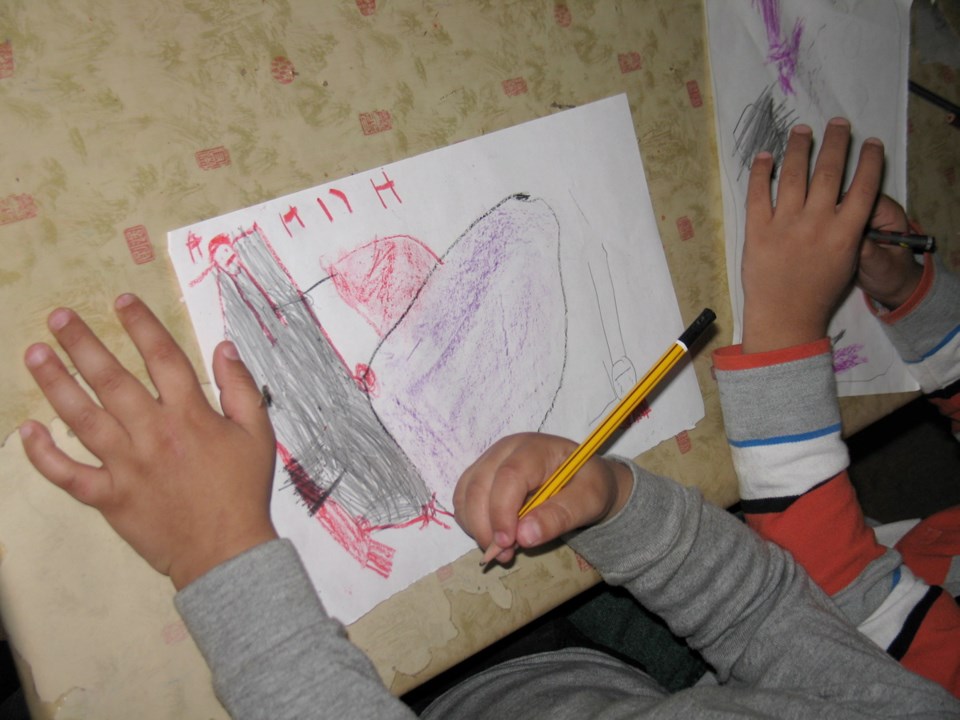Creativity should be nurtured in every child, even though only a few may grow into geniuses, says a Vancouver Island expert on art education.
Heather Pastro, professor of art education at Vancouver Island University in Nanaimo, said she is always a little saddened to hear anybody at any age denigrate their own, or anybody’s, creative talent.
“I’ve been doing this for over 30 years and I know creativity is something that we can develop, promote and foster and nurture in children,” she said.
Psychologists are now recognizing creativity is not just for those few blessed with the talent to become artists. It’s part of everyday life for all.
American Richard Hass, a member of the editorial board of the journal Psychology of Aesthetics, Creativity and the Arts, notes that creative impulses can be engaged in such mundane tasks as finding our way around a traffic jam, making supper or even planning a career.
It’s anything but the sole domain of those enrolled in programs for gifted kids, or children who display talent in traditional “creative” fields such as music, drawing or dance.
“Scientists are recognizing that creativity is not for the chosen few,” said Hass, who studies creativity from a social and cognitive perspective.
Pastro said for her, fostering creativity in young children is the first, best opportunity for nurturing a talent for creative thinking.
“We know creativity and imagination peaks in the preschool years,” she said. “When they get into school, it often drops off, which is really disappointing.
“That’s why as parents we can have such a huge impact.”
Pastro likes to say nurturing children’s creativity begins with respect: for their efforts, for their accomplishments and even for their freedom to make mistakes.
The other important element is for parents to value children’s creative process, imagination and accomplishments — and to demonstrate that.
For example, parents can take pictures of the children’s cooking projects to remind them later on of their achievement. Stick the art work on the fridge. Even better, immortalize some of their creations in a frame.
“Displaying their work is so important,” said Pastro. “It’s so kids will feel there is a sense of value in what they do.”
Recognize also, she said, that when a child exercises creativity, there is rarely one right way to do anything. To think outside the box means exploring various options.
Pastro likes to paraphrase a comment she once heard from Canadian wildlife artist and Saltspring resident Robert Bateman, when it comes to examining children’s artwork.
She recalls that Bateman said it doesn’t matter if a child’s drawing of a penguin is perfectly shaped and coloured in authentic black and white. What is important is the child’s unique vision.
“What is really useful for us as teachers, or as parents, is to say to a child, ‘You know what? This is the only drawing of a penguin that looks quite like that,’” said Pastro. “We can say, ‘In the whole world, nobody has ever drawn a penguin quite like that.’ ”
While childhood may be the best time to foster creativity, Pastro said, it should not be the last. Adults can think outside the box, or foster talents or abilities they have long neglected.
“Many of us have those experiences where we weren’t picked for volleyball or were told to ‘just hum’ in music class,” she said. “But I’m a huge believer that intuition and creative skill is something that can be developed.
“We all have creativity,” Pastro said. “If we haven’t had it nurtured and promoted when we were young children, then it’s something we can develop as adults.”
Tips for nurturing creativity:
• Creativity is fostered by an open attitude to change, new experiences and interests. Trips to things like museums, cultural events are always helpful.
• Play word games with your child. Emphasize how different words can describe the same thing.
• Your child may excel only in certain areas. That’s OK. But it should not mean your children should stop exploring areas they don’t naturally excel.
• Acting, devising plays or performing improv drama skits can help children develop creative and social skills. Drama camp may not make your child into Meryl Streep but it won’t hurt.
• Encourage active, imaginative play. This includes drawing, pretending with toys, putting on a play or any other imaginative efforts.
• Work on an art project together, like a collage, with your child. Creativity is often a collaborative effort,
• Emphasize that the amount of effort exerted is often more important than the result. Successful creators are not afraid to fail.
• Recycle, re-use and re-purpose things in the house. Children learn a lot from watching adults, so witnessing objects put to uses for which they were not designed is useful.
• Remember, you are likely not raising the next Mozart. You are, however, helping your child to overcome everyday problems.
Source: Richard Hass, a visiting assistant professor at Rowan University, in New Jersey.
